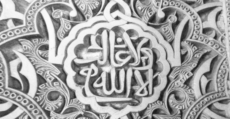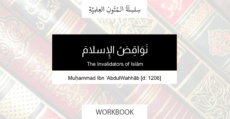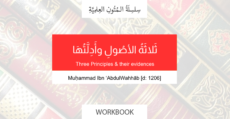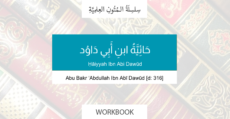Ā ā Ī ī Ḥ ḥ Ṣ ṣ Ṭ ṭ Ū ū Ẓ ẓ
It has been related about the Shaykh, raḥimahullah, that on one occasion during his lesson, [his students] said to him – in a story which is [now] well-known:
O Abu ‘Alī… or O our Shaykh, we are always studying ‘aqīdah and tawḥīd, tawḥīd and ‘aqīdah [so] until when [are we going to carry on]? We want to study fiqh.
They wanted to broaden their knowledge of the various sciences of Islamic knowledge. And this [incident] occurred during the early period of the Shaykh’s da’wah; So he said to them:
Allow me to ponder and reflect [on your request].
So when he arrived [for his lesson] the following day, they noticed [the expression on] his face had changed [from what was normal]. So they said to him:
What has upset you [O Shaykh]?
He replied:
I have [just] been informed of news which has [really] disturbed me; And it is that in one of the houses [here] in ad-Dar’iyyah, a man has engaged in intercourse with his mother – and we seek refuge in Allāh [from such an evil deed].
[Horrified at the news,] the students responded:
We seek refuge in Allāh [from such an evil deed]; How is that possible? We must go and verify this; Thereafter, we shall see [whether or not it is true].
So when the students returned – and of course the Shaykh had sent them as an educational exercise – delighted [at what they had discovered], they approached the Shaykh, and said:
The situation is not like that [O Shaykh]; We found the mother at home, and she had been afflicted with some harm, and one of the people had said: Slaughter a sheep by the doorstep, and allow it’s blood to flow [over the doorstep], and this shall suffice in warding off the evil and harm [the mother had been afflicted with].
[Relieved upon hearing this] the students said to the Shaykh:
Allāh has [certainly] brought good news, O Shaykh!
Notice, how catastrophic the news of a man engaging in intercourse with his mother had been for them, and [rightfully so was] their great concern about this transgression against the law of Allāh; However, when the issue was one of major Shirk in the form described, their hearts were not enraged with emotion. This [clearly] indicates that [the true essence of] tawḥīd had not become firmly rooted [in their hearts].
And this [incident] is similar to what is the case today. [We notice how] some people see a woman without ḥijāb, and their hearts become enraged, yet when they see an innovative practice, or a major shirk occurring, their hearts are not stirred [the slightest]; Or if they see a dome over a grave – it is as if nothing has happened [and this is normal], so their hearts are not stirred with [the necessary] emotion [at such transgression against the law of Allāh].
Therefore, the hearts have not yet [truly] learnt [and understood] tawheed; And because of this, the Shaykh said in his treatise ‘Kashf ash-Shubuhāt’:
…and to know that the speech of the ignorant one: ‘[As for] tawḥīd [then] we have understood it’…this is indeed from the greatest [signs] of ignorance and [indicative of] the machinations of Shayṭān.
Therefore, these priorities must be in place, because [unfortunately] some people say:
This community of ours – and all praise is due to Allāh [alone] – is not in need of tawḥīd, [what] we need is [some] clarification of evil and detestable matters; we need [some] explanation of fiqh [issues].
So [in response] we say to them:
No. The reality is not like that.
So when [the heart] stirs, you find that loyalty and enmity in the heart is not as it should be, and that knowledge of tawḥīd and the love for it, and love for Ahlus-Sunnah wherever they may be is not as it should be; And honouring the man for that which he has of tawḥīd and aiding [the dissemination of] it is not as it should be, and likewise is the case with many [other] issues.
Therefore, the [wise and] reformist Imām taught tawḥīd to establish a principle linking it to tawḥīd, because the community can not be [united and] established upon [anything] other than tawḥīd. So it is not possible for the community to be [united and] established, and nor for there to be any link between the likes of this country or other than it from the various countries holding opposing views other than [upon] something which will bring them together, and that is the rope of Allāh, jalla wa ‘alaa:
{وَاعْتَصِمُوا بِحَبْلِ اللَّهِ جَمِيعًا وَلَا تَفَرَّقُوا}
{And hold firm together to the Rope of Allāh, and do not be divided} [03:103]
And some of those with malicious intent benefitted from this [important] lesson; So Marx the Communist – in his correspondence with Engels – encountered some issues related to aiding the Proletariat and the future of Communist theorisation; And this was [all] before it was practical. [So] he (Marx) spoke about Shaykh Muḥammad ibn ‘Abdil-Wahhāb, saying:
Look at that desert fox; how he has managed to wear the garment of ascetism, knowledge and religion and [despite doing so] managed to unite the [Arabian] peninsula upon a single word, and [now] he exerts himself in spreading it beyond [the peninsula].
…obviously, this [quote from him] is [all] based upon how he perceived the situation.
[So] why do we say [our] ‘aqīdah, tawḥīd, knowledge, [and] manhaj is [all] one?
Because it is not possible for a country to [unite and] establish might, nor da’wah, nor the commanding of good and forbidding of evil except by way of group spirit and uniting upon a matter; And this matter is the tawḥīd of Allāh, jalla wa ‘alaa. Anything other than it – wherever it may be – will simply not be adequate. That is because anything [other than tawḥīd] condones that which opposes [it], and tawḥīd [certainly] does not condone that which opposes it! [So] tawḥīd flows through [our] souls because it is the fitrah (natural disposition) [upon which we were created].
So because of that, there is might in gathering together upon the tawḥīd of Allāh, jalla wa ‘alaa, and therein lies the strength to spread and prevail. And this is what the [wise and] reformist Imām perceived; He did not consider it as a da’wah benefit for which he [should] plan, rather it came about as a natural result due to the adherence of the da’wah of [the Prophet] Muhammad ﷺ. Therefore, bringing order to the main priorities was patently clear in the da’wah of the [wise and] reformist Imām; So he began with the call to tawḥīd [and] knowledge [of the laws of Allāh] as he set about cultivating the society [upon this da’wah]. And his approach [in conveying the da’wah] differed according to the various denominations within the society, and so on.






